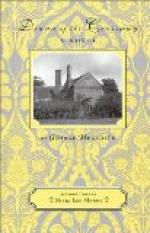’I will write. From whatever place, you shall have letters, and constant. I write no more now. In my present mood I find no alternative between rageing and drivelling. I am henceforth dead to the world. Never dead to Emma till my breath is gone—poor flame! I blow at a bed-room candle, by which I write in a brown fog, and behold what I am— though not even serving to write such a tangled scrawl as this. I am of no mortal service. In two days I shall be out of England. Within a week you shall hear where. I long for your heart on mine, your dear eyes. You have faith in me, and I fly from you!—I must be mad. Yet I feel calmly reasonable. I know that this is the thing to do. Some years hence a grey woman may return, to hear of a butterfly Diana, that had her day and disappeared. Better than a mewing and courtseying simulacrum of the woman—I drivel again. Adieu. I suppose I am not liable to capture and imprisonment until the day when my name is cited to appear. I have left London. This letter and I quit the scene by different routes—I would they were one. My beloved! I have an ache—I think I am wronging you. I am not mistress of myself, and do as something within me, wiser, than I, dictates.—You will write kindly. Write your whole heart. It is not compassion I want, I want you. I can bear stripes from you. Let me hear Emma’s voice—the true voice. This running away merits your reproaches. It will look like—. I have more to confess: the tigress in me wishes it were! I should then have a reckless passion to fold me about, and the glory infernal, if you name it so, and so it would be— of suffering for and with some one else. As it is, I am utterly solitary, sustained neither from above nor below, except within myself, and that is all fire and smoke, like their new engines.—I kiss this miserable sheet of paper. Yes, I judge that I have run off a line—and what a line! which hardly shows a trace for breathing things to follow until they feel the transgression in wreck. How immensely nature seems to prefer men to women!—But this paper is happier than the writer.
‘Your Tony.’
That was the end. Emma kissed it in tears. They had often talked of the possibility of a classic friendship between women, the alliance of a mutual devotedness men choose to doubt of. She caught herself accusing Tony of the lapse from friendship. Hither should the true friend have flown unerringly.




